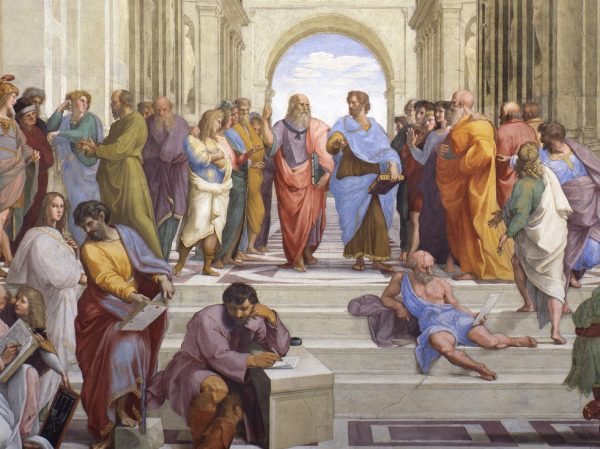An Advent reflection.
The University Has Lost its Way

When God recedes, nihilism takes His place.
As part of our ongoing efforts to diagnose the failures of higher education, we present three pieces by college students writing “from the ground,” giving firsthand accounts of life in the 21st-century academy.—Eds.
The modern university’s promise of an education is like a pair of fake Yeezys—purchased for the prestige, but an imposter of the real thing.
Higher education used to develop the whole person, mind and soul alike. That was back when elite colleges like Harvard espoused principles like “Moral precepts are deduced only from the will of God.” Students studied the classics and theology not just for the accumulation of knowledge, but for the cultivation of virtue.
Not anymore.
Somewhere along the way the governing philosophy shifted. Reason and revelation were no longer the driving forces, and increasing secularization cast doubt on who was right about right living. Instead of grappling with difficult questions, pluralism took the easy way out.
We lost something in the process of trying so hard to accept different viewpoints and lifestyles. We lost a vision of what a person is and should be. We lost an idea about how to live a good life—or even whether that’s a suitable question to ask at a university in the first place. What’s more, we lost our conception of justice, which should be a source of national unity.
By refusing to take a position—to ground the institution in a coherent philosophy—we hollowed out the substance of the university. We reduced its function to producing good boys and girls who know how to play the game, win diplomas, and land jobs, but not live good lives.
From God to Godlessness
We’ve made the university into a cog in the capitalist machine, producing “more qualified” laborers while totally ignoring the humanity of the individuals passing through. Students have become economic units to be enhanced, not souls to be enriched.
There are, in fact, deep consequences of this shift in function. The secular American university has become an environment devoid of meaning. And when God is dead, nihilism or ideology take His place. Students respond accordingly.
I go to a large, secular institution, and I’ve seen it. Some medicate away the existential angst of living a life with no purpose by indulging in drugs and alcohol. Others pursue their careers relentlessly, as if the secret to personal fulfillment and eternal happiness sits at the top of the corporate ladder. But still more find solace in the Leftist orthodoxy that gives them something to fight for (and against), as well as a sense of moral superiority.
While the utility of these lifestyle choices is up for debate (i.e., motivated SJWs might be effective change-makers in society), in the end, none satisfies the soul. Depression, anxiety, and suicide are more prevalent in college students today than they have been in any point in American history. The lack of meaning hurts students.
My first year of college, I attended The Master’s University, a small Christian school. The university has a clear aim—knowing God, developing moral integrity, and growing intellectually—and each subject is viewed through the lens of Christianity, from biology to economics. Students are united by a common pursuit, and their lives have purpose. There are fewer lonely people. It has its faults, but on the whole, the environment produced happy students.
I now go to the University of Southern California. There are pockets of community, sure, but nothing tying the broader student body together (except maybe the football team). There is no common purpose, only thousands of individuals with individual goals that occasionally overlap. People walk with their headphones in. They’re more isolated and have less in common with their classmates. My three descriptions above of students searching for meaning in places they won’t find it are drawn directly from observation. People are yearning for something they just can’t seem to grasp. And they’re suffering because of it.
Coming Back to Our Senses
The philosophical change in higher education doesn’t lend itself to simple solutions. Can we revive the role of religion in college curricula despite the increased secularization of the country as a whole? Can we develop a common vision of the good life—or something close to it—in such a diverse America?
Answers to these questions require taking a stance: pluralistic relativism won’t cut it. Institutions must have a philosophy about human nature and right living. They must decide whether higher education is solely for the purpose of job preparation, or for the cultivation of the mind and soul.
I have no delusions that the Ivies will somehow turn into seminaries, but at the very least they can respect the religious tradition that contributed to the country’s founding. I’m arguing for the injection of God back into the university. The best-case scenario is a shift in worldview among those influencing college curricula. Administrators, faculty, and board members who care about the virtue of their students will shape their environments to produce it. They should be persuaded or gradually replaced.
Practically, this might manifest in something like a liberal arts common core that all students must take. Reading Homer allows one to see models of both human excellence and human failure. Diving into Plato and Aristotle prods one to ponder the deeper questions about ethics and happiness. A course on the Bible and Judeo-Christian principles gives insight into the philosophical underpinnings of Western civilization.
The answer to the question of what constitutes the good life is not entirely obvious. But at the modern university, the question isn’t even being asked.
Higher education should be about producing better people, not merely useful ones.
The American Mind presents a range of perspectives. Views are writers’ own and do not necessarily represent those of The Claremont Institute.
The American Mind is a publication of the Claremont Institute, a non-profit 501(c)(3) organization, dedicated to restoring the principles of the American Founding to their rightful, preeminent authority in our national life. Interested in supporting our work? Gifts to the Claremont Institute are tax-deductible.
Alabama’s great public universities are folding to the diversity agenda.
Blame the universities for rising antisemitism.
The warning is coming from inside the bubble.
Donors need to support institutions that produce quality PhDs.
“Poverty Simulation” is an absurd exercise in political indoctrination.






